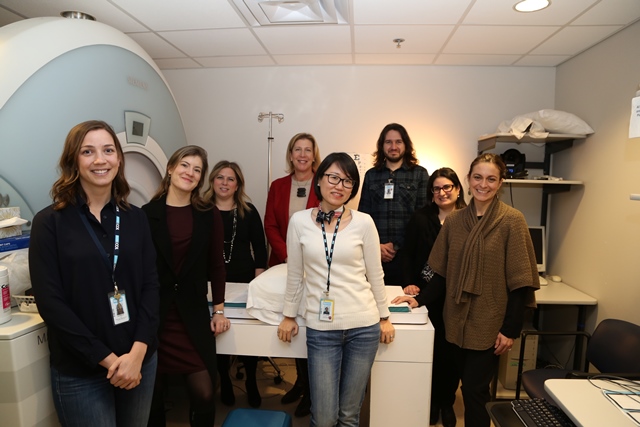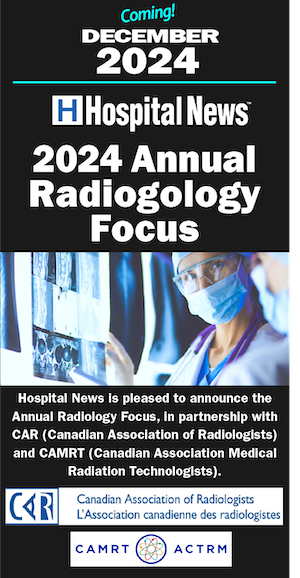By Elise Johnson
“I just plough through, that’s something I learned from my mom. Just plough through,” says Barbara Schechter, a young caregiver featured in CBC’s recent documentary, The Caregivers Club, which takes an intimate and compassionate look at the lives of four caregivers and their loved ones living with dementia. The families are also part of the Baycrest Health Sciences community in Toronto.
With three young children and a full time job, Barbara is also a caregiver for her mother. “The only thing that gets you through the day is how you’re going to manage and how you’re going to make your mom safe,” says Barbara in the documentary.
There are currently 564,000 Canadians living with dementia, and that number is expected to double by 2031. As Canada’s population ages, more and better care is needed.
That’s what drives the researchers at Baycrest Health Sciences.
Baycrest is ranked as one of the most research-intensive hospitals in Canada and is a member of the Council of Academic Hospitals of Ontario, which represents Ontario’s research hospitals. Research hospitals play a unique and vital role in Ontario’s health system, providing advanced patient care services, training the healthcare workforce, and conducting leading-edge research to discover tomorrow’s care today. They generate the expertise and evidence to drive change as system leaders, building a healthier, wealthier, smarter Ontario.
And Baycrest is doing just that. Its Rotman Research Institute is among the world’s top research institutes in cognitive neuroscience. The Centre for Aging and Brain Health Innovation, led by Baycrest Health Sciences, helps to accelerate brain health and aging solutions. Together, Baycrest is advancing dementia care for patients locally and globally, discovering better ways to diagnose, prevent and treat dementia and other brain disorders.
Research at Baycrest is part of a continuous cycle, where foundational brain research leads to clinical testing, which leads to innovations supporting healthy aging, which leads to more questions about the fundamental mechanisms of the brain.
Is my memory normal? At-home assessments and iPad apps
Early detection and prevention of memory problems and cognitive impairment is a major area of focus at Baycrest. Cogniciti, a digital health company led by Baycrest researchers, is empowering adults to assess their memory in the comfort of their own homes. Free, private and clinically researched, the digital brain health assessment has helped more than 60,000 adults answer the question, “Is my memory normal or should I see my doctor?”
Gaining the patient perspective through age related training
Test-takers age 40 and up solve a series of evidence-based puzzles, including shape matching, face and name matching, and a number-letter alternating test. Based on performance, they receive a memory report and may be advised to connect with their family doctor for next steps in care. Through the brain health assessment, Cogniciti provides researchers access to a rich pool of interested volunteers to help advance memory research.
Another initiative accelerating research into Alzheimer’s and dementia treatments is Baycrest’s work with the Toronto Dementia Research Alliance (TDRA). The Sam and Ida Ross Memory Clinic at Baycrest is the initial pilot site for the newly developed Toronto Cognitive Assessment (TorCA), which utilizes an iPad to capture anonymous patient information and pools it onto a secure, research recruitment database that will be shared amongst TDRA memory clinics. This data will allow scientists to widen their pool of research subjects and easily identify and recruit consenting subjects who match the criteria for their dementia studies.
The TorCA is a sensitive tool that can identify patients at risk of dementia earlier. The assessment not only informs research on detection of memory-related conditions, it also saves costs for the health system and saves patients from having to pursue unnecessary cognitive tests.
Currently, Ontario patients concerned with cognitive impairment receive assessments from specialists. The TorCA iPad app is a game changer, allowing any health care professional to assess patients upfront and determine whether they need to pursue a more lengthy and resource intensive neuropsychology exam. The hope is that this tool will soon be clinically available across TDRA hospital sites within Toronto – and beyond— free of charge.
Getting a glimpse into a brain with dementia
What if you could detect the minute changes that occur in the brain over the course of a person’s life? Researchers at Baycrest are getting the chance to do just that by using magnetic resonance imaging (MRI) to study the aging brain, including brains with very early dementia.
Cognitive tests, similar to the Toronto Cognitive Assessment, led Dr. Rosanna Olsen and her team to wonder whether physical differences could be detected in the brains of healthy adults who scored poorly compared to those who scored well.
Her cross-sectional study found that people who scored lower on cognitive tests had a smaller “memory region” of the brain – the same region that is first affected in Alzheimer’s disease. This finding has allowed researchers to use both memory region brain measures and low cognitive test scores as biomarkers (a biological flag) for Alzheimer’s disease, which is a big step forward for the detection and prevention of dementia.
Innovative treatment for older adults with depression and Alzheimer’s disease
Up to 70 per cent of people living with Alzheimer’s disease also suffer from depression, which does not typically respond to standard antidepressant treatments. Dr. Linda Mah and Dr. Jed Meltzer are using a non-invasive procedure called transcranial magnetic stimulation (TMS) to reduce symptoms of depression in older adults with Alzheimer’s.
TMS uses magnetic fields to stimulate or inhibit neurons in the brain. Although TMS is approved as a treatment for depression, researchers are aiming to treat other neurologic and psychiatric conditions. Drs. Mah and Meltzer will evaluate the effects of TMS on both mood and memory in Alzheimer’s patients who also suffer from clinical depression. For Alzheimer’s patients, this could mean tapping into brain stimulation to treat their symptoms.
Patient and family care driving research
Research at Baycrest goes both ways. Not only is evidence informing how clinicians, occupational therapists, personal support workers and volunteers care for Baycrest clients, but researchers are also evaluating services to ensure high quality care and support.
The Road to Connection program is a great example of this. It’s an arts-based program that brings together caregivers and their partners with dementia for creative sessions and discussion. The program empowers dementia patients to tap into their creative skills while serving as a support group for caregivers. On top of that, the program gives caregivers an opportunity to celebrate their partners through the art they have created and come away with a shared, meaningful experience.
“We could come back together at the end of the day with something for both of us,” said one caregiver participating in the program. “There aren’t many programs like this one that allow caregivers to meet and share without leaving loved ones behind.”
Baycrest researchers are evaluating the Road to Connection program with the hope of duplicating it across other sites within the Baycrest community and in Ontario.
Baycrest researchers have evaluated and helped redesign volunteer programs to improve resident engagement in Baycrest’s long-term care facility, the Apotex Centre. The Program for Leisure Engagement for Active and Spontaneous Experiences (PLEASE) is an evidence-based model that trains volunteers to work one-on-one and in small groups with residents, when they ask the simple question, “What do you want to do today?” The evaluation found that the PLEASE program enhanced the abilities and personhood of residents – more smiling, talking and engagement. Researchers are also exploring the use of volunteer visits to help older adults with dementia preserve or improve their thinking abilities.
This work helps long-term care homes incorporate cost-effective programs to improve care for residents with dementia and create new roles for volunteers working with older adults.
A century of excellence in complex care, research and training
The world’s population is aging rapidly, and Baycrest has the expertise to deliver proactive solutions. Now in its centennial year, Baycrest has spent 100 years pioneering the science of health and aging.
Baycrest provides compassionate, specialized care, conducts cutting-edge cognitive neuroscience research, commercializes innovative solutions, and trains the next generation of health care professionals with the skills needed to support and respond to the diverse and complex needs of older adults.
Elise Johnson is Communications Advisor for the Council of Academic Hospitals of Ontario




